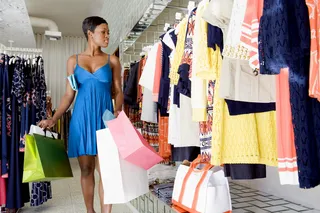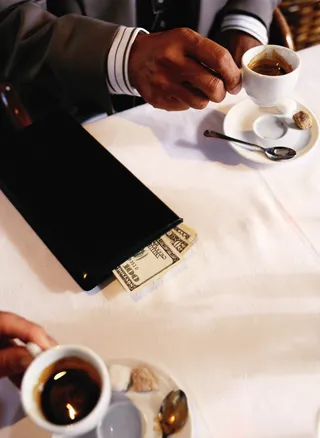#INTHEBLACK: Black Buying Power by the Numbers
Black buying power is expected to hit $1.2 trillion in 2015.

1 / 12
It All Adds Up - Estimated at nearly $1 trillion in 2011, African-American buying power continues to grow and is expected to swell to $1.2 trillion by 2015. To further raise awareness around the economic opportunities Black consumers present to global brands, BET Networks — along with other leaders in Black-owned media and advertising — have launched the #INTHEBLACK campaign.Keep reading to see how your dollars add up. —Britt Middleton (Photo: Getty Images/moodboard RF)
Photo By Photo: moodboard/Getty Images

2 / 12
Spending Power - “We are excited to partner with some of the nation’s most influential media and marketing groups to highlight the growing economic opportunity of the Black marketplace. As a collective, we are better positioned to demonstrate the value of targeting the black consumer audience and partnering with leading brands to help them succeed,” said Debra L. Lee, BET Networks chairman and chief executive, of the new initiative. (Photo: GfK MRI Doublebase 2011 African American Volumetrics Category Expenditure Data)

3 / 12
Big Spenders - In 2010, African-Americans' buying power contributed $957 billion to the U.S. economy, making African-Americans the 16th economy behind Canada. (Source: Gfk MRI Doublebase 2011 African-American Volumetrics Category Expenditure Data) (Photo: Getty Images/Blend Images)

4 / 12
Dialed In - Thirty-three percent of all African-Americans own a smartphone, and Blacks use more than twice the amount of mobile-phone voice minutes compared to whites (1,298 minutes a month compared to 606 minutes, respectively). (Source: Nielsen 2011 State of the African-American Consumer) (Photo: Alex Wong/Getty Images)

5 / 12
Box Office Draw - Be it a summer blockbuster or tear-jerker, African-Americans spend $6.3 billion at the movies each year. (Source: Gfk MRI Doublebase) (Photo: Courtesy AMC Theatres)
ADVERTISEMENT

6 / 12
The Luxe Life - African-Americans make more shopping trips than all other groups, but spend less money per trip. African-Americans in higher income brackets also spend 300 percent more in higher-end retail grocers than any other high-income household. (Source: Nielsen) (Photo: Andersen Ross/GettyImages)

7 / 12
Family Meals - African-Americans have spent $2.5 billion over the past six months at quick service restaurants and family-style restaurants. (Source: Gfk MRI Doublebase) (Photo: GettyImages)
Photo By GettyImages

8 / 12
World Wide Influence - With a buying power of nearly $1 trillion annually, if African-Americans were a country, they’d be the 16th largest country in the world. (Source: Nielsen) (Photo: Spencer Platt/Getty Images)

9 / 12
Bringing Values Home - African-American households spend $32.7 billion yearly in products such as canned food, frozen food, prepared meals, beverages, seasonings and spices. (Source: Gfk MRI Doublebase) (Photo: Michael Bradley/Getty Images)

10 / 12
Smart Shoppers - Black women spend $19.7 billion on groceries, personal care products and household goods. (Source: Gfk MRI Doublebase) (Photo: Philadelphia Inquirer/MCT /Landov)
ADVERTISEMENT

11 / 12
Earning Power - Between 2000-2009, African-American homes experienced significant growth among households earning $75,000 or more (up 63.9 percent) and households earning $100,000 or more (up 88.7 percent). (Source: Nielsen)(Photo: Getty Images)
